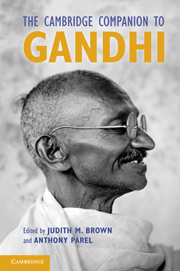Book contents
- Frontmatter
- Introduction
- Part I Gandhi: The historical life
- Part II Gandhi: Thinker and activist
- 4 Gandhi’s key writings
- 5 Gandhi’s religion and its relation to his politics
- 6 Conflict and nonviolence
- 7 Gandhi’s moral economics: The sins of wealth without work and commerce without morality
- 8 Gandhi and the state
- 9 Gandhi and social relations
- Part III. The contemporary Gandhi
- Guide to further reading
- Index
8 - Gandhi and the state
from Part II - Gandhi: Thinker and activist
Published online by Cambridge University Press: 28 May 2011
- Frontmatter
- Introduction
- Part I Gandhi: The historical life
- Part II Gandhi: Thinker and activist
- 4 Gandhi’s key writings
- 5 Gandhi’s religion and its relation to his politics
- 6 Conflict and nonviolence
- 7 Gandhi’s moral economics: The sins of wealth without work and commerce without morality
- 8 Gandhi and the state
- 9 Gandhi and social relations
- Part III. The contemporary Gandhi
- Guide to further reading
- Index
Summary
The state, understood as the legitimate supreme coercive authority of the political community, is an integral part of Gandhi’s political philosophy. Amajor goal of his political activities as a leader of the Indian nationalist movement had been the establishment of a sovereign coercive state for India. Without such a state, it would have been impossible to realize to the full his vision of political swaraj.
Not being a political philosopher in the formal sense, Gandhi did not write a treatise on the subject of the state. However, ideas relating to the state are found scattered in his writings. His two theoretical works, Hind Swaraj and Constructive Program, are of special importance here. The state is the focal point of Hind Swaraj. The work ultimately is about the sort of state that Gandhi wanted for India. The term swaraj, in the title Hind Swaraj, he translated as ‘home rule’ – a nineteenth-century term for the state that enjoyed self-government. What complicates matters for the reader is the fact that the book uses the terms waraj in a second sense, meaning ‘self-rule’ that the inner self enjoys or is capable of enjoying. Thus Hind Swaraj wants swaraj in both senses: it wants political swaraj in the sense of home rule for India and spiritual swaraj in the sense of inner ‘self-rule’ for Indians. The focal point of Constructive Programme is Non-Governmental Organizations (NGOs) of civil society. However, the general thesis of the work is that the NGOs should work in tandem with the state. The state therefore is taken for granted here.
- Type
- Chapter
- Information
- The Cambridge Companion to Gandhi , pp. 154 - 172Publisher: Cambridge University PressPrint publication year: 2011
- 4
- Cited by

